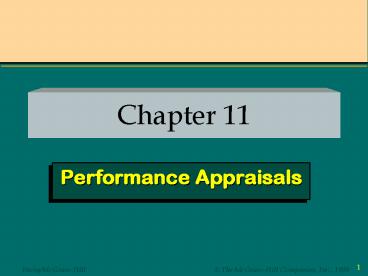Performance Appraisals - PowerPoint PPT Presentation
1 / 24
Title: Performance Appraisals
1
- Performance Appraisals
2
You cant manage what you dont understand. You
dont understand what you dont measure. What
gets measured gets done. What gets measured gets
rewarded.
3
Performance Evaluation
- Control mechanism for feedback
- Allows progress to be assessed
- Ensures strategy-consistent behavior
- Reinforces values of the organization
- Ensures alignment of individual performance and
behavior to organization culture and work systems
4
The goal of performance management is
- To make sure that employee goals, employee
behaviors used to achieve these goals, and
feedback of information about the processes are
all linked to corporate strategy.
5
Purposes of Performance Appraisal
- Evaluation
- Performance Measurement
- Compensation
- Motivation
- Development
- Management Development
- Identification of Potential
- Feedback
- Human Resource Planning
- Communications
- Performance Improvement
- Research on Legal Compliance
6
Performance AppraisalConflicts in Goals
ORGANIZATION Seeking the development of
individuals through counseling, coaching, and
career planning.
INDIVIDUALS Seeking valid performance feedback so
they know where they stand and can develop.
MAJOR CONFLICT
CONFLICT
ORGANIZATION Seeking information from individuals
on which to base rewards and make personnel
decisions.
INDIVIDUALS Seeking important rewards and
maintenance ofself-image.
MAJOR CONFLICT
Source M. Beer, Performance Appraisal Dilemmas
and Possibilities, Organizational Dynamics
(Winter 1981) 27.
7
Strategies to Better Understand and Measure Job
Performance
Improve Appraisal Formats
Select the Right Raters
Understand Why Raters Make Mistakes
8
Performance Appraisal Approaches
- Comparative
- ranking
- forced distribution
- paired comparison
- Attribute
- graphic rating scales
- mixed standard scales
- Behavioral
- critical incidents
- BARS
- essay
- Results
- MBO
Show me the performance!
9
An Evaluation of Performance Appraisal Formats
CRITERIA
Personnel Research
Employee Development
Format
Administration
Cost
Validity
poor
poor
average
good
average
Ranking
Standard Rating Scale
good
average
average
average
average
good
average
BARs
good
good
good
excellent
poor
MBO
poor
poor
excellent
unknown
Essay
poor
poor
average
unknown
10
Select the Right Raters
Supervisors
Peers
Self
Customers
Subordinates
Vendors
11
Selecting the Right Rater
- Supervisors as Rater- most common, familiar with
the work of the employee, familiar with job
requirements - Peers as Raters- good for group setting, but can
lead to group tensions or unrealistic evaluations
if the raters are not trained or do not
understand the purpose of the rating. - Self as Rater- complete knowledge about
performance, most lenient, good for developmental
purposes.
12
Understand Why RatersMake Mistakes
13
Why Raters Make Mistakes
- Stages in the Rating Process
- Ratee is observed
- Behavior is encoded (stereotypes may be used)
- Information is put into memory (oops some is
forgotten) - Information is retrieved and reconsidered in
light of other non-performance information
14
Errors in the Rating Process
- Errors in Observation (Attention)
- examines what raters pay attention to when they
are evaluation performance. e.g. appearance and
race, changes in performance over time (erratic
vs. consistent, better vs worse) - Errors in Storage and Recall
- information is stored in the form of traits and
retrieve in the form of trait categories. - decay of memory
15
Errors in the Rating Process Cont.
- Errors in Evaluation
- unwilling to differentiate between workers
- uneasy giving feedback
- political vs rational process
16
Requirements For a Good Appraisal
- provide a sound basis for performance standards
- involve employees in developing performance
dimensions - train raters
- motivate raters to do an accurate job
- document employee performance to help memory
17
Adjust Employees Into Structure
- Green Circle Policy - Employees under pay range
minimums - Red Circle Policy - Employees above pay range
maximum - Fit pay level policy and pay objectives
- attracting and retaining employees
- fairness perceptions
- labor cost
- legal compliance
18
Green Circle Policy
- Bring pay up to minimum
- Set pay above minimum based on seniority and/or
performance
19
Red Circle Policy
- freeze salary till market catches
- promote to higher grade
- move job to higher grade
- cut pay to pay range maximum
- do nothing
- hybrid - freeze or reduce salary depending on
- how far outside of range
- performance of employee
- criticality of job/employee
20
Performance-and Position-Based Guidelines
- Purpose
- Poorer performing employees will receive lower
pay increases - Control costs
21
Designing Merit Guidelines
- Five questions must be answered in order to
design a merit guideline - what increase should the poorest performers
receive? - Sorry cannot be negative
- what increase should average performers receive?
- At least enough to keep up with COL
22
Designing Merit Guidelines
- what increase should top performers receive
- how much of a differential should there be in the
percentage rewards between performance
categories? - Becomes a cost issue
- how much of a differential should there be based
upon position in pay range. - Decisions should be consistent with pay level
policy and pay objectives
23
How to Create a Merit Pay Grid
- Merit Grids Combine 3 Variables
- Level of Performance
- Distribution of Employees Within Pay Ranges
- Merit Budget Increase Percentage
24
FastCat
- Total Budget Increase 5
- Adjustments into pay structure
- Merit increases































